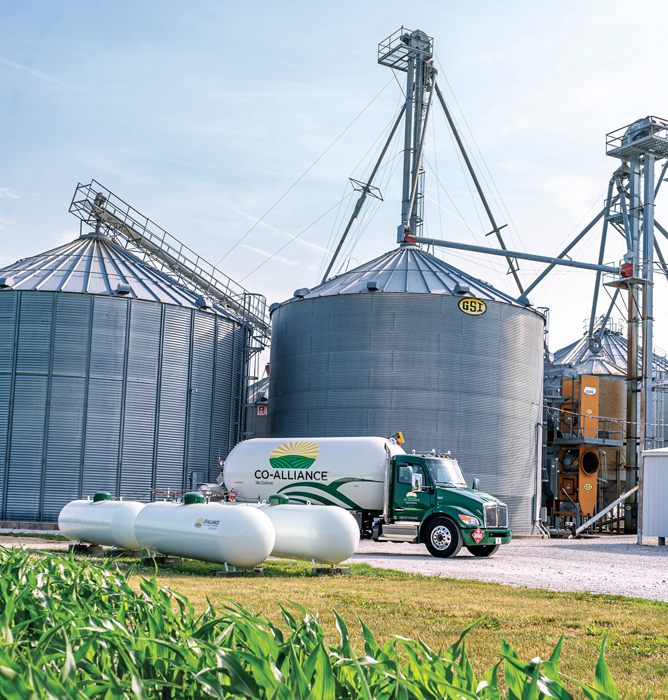Propane’s role in the ag market: An overview of key applications

Propane plays an important role in multiple applications on the farm. (Photo courtesy of Co-Alliance Cooperative Inc.)
Propane plays a vital role in the agricultural industry. From grain dryers and irrigation engines to innovative equipment like poultry house sanitizers or flame weeding systems, producers rely on propane to enhance productivity and improve efficiency. While most ag customers are aware of propane’s benefits for certain applications, they may not recognize the diversity and versatility of the fuel source.
Grain drying
More than 80 percent of grain dryers run on propane – and for good reason. Propane-powered grain dryers offer lower costs of operation, better efficiency and increased reliability and productivity. The design of new models offers precise temperature control for consistent moisture removal and more evenly dried, higher quality grain. Grain drying helps producers avoid harvest loss from field drying – which results in as much as 24 percent decreased yield – and crop damage from inclement weather and wildlife.
Designed with fast-paced, high-yield operations in mind, modern propane grain dryers require 50 percent less thermal energy than older models and are designed for a longer lifespan and low maintenance. This equates to more savings and less drying time or downtime.
Irrigation engines
From grains to fruits or vegetables, efficient irrigation is vital for high-quality crops. Propane irrigation engines are reliable and offer lower emissions and better cost savings compared to similar diesel- or electric-powered engines. Most farmers save 40 percent or more with propane engines compared to diesel, and they offer up to 300 horsepower of continuous power that is independent of the grid system.
Propane engines also offer reduced emissions, making it easy for producers to meet all environmental regulations without additional time or steps needed. Propane burns cleaner and has fewer deposits on engine components; this also contributes to a longer engine life for long-term savings.
Flame weed control
Propane flame weeding is an effective, organic method for weed control that also controls herbicide-resistant weeds. Handheld and tractor-pulled weed control systems concentrate flames on weeds, causing them to wilt and die, with no negative impact on the quality of surface or underground water. Unlike mechanical cultivation or herbicide treatment, propane flame weeding does not disturb the soil so it can be used when soil is wet, and farmers can immediately return to their fields following its use.
Building and water heating
Propane keeps plants, poultry, livestock and producers’ bottom lines healthier. Propane building heat – including boilers, hot air furnaces or radiant heaters – offers consistent power, maintaining precise room temperatures within 0.5 degrees Fahrenheit and thermal efficiencies up to 95 percent. Propane storage tank and tankless systems also heat water more efficiently, using less energy and cost to operate than electric models. From providing warm water or buildings for livestock to delivering high heat for equipment sanitation, propane heating systems contribute to healthier plants and animals.
Generators
Sudden, unexpected power outages can significantly disrupt agricultural operations. With propane, farmers can take back control over energy and ensure continuous access to the power needed to keep things running smoothly. Propane-powered generators provide added security by preventing costly interruptions and ensure critical farm equipment, like water wells and building ventilation fans, is always functioning properly.
Propane is a sustainable, efficient energy source that can handle almost any job on the farm, also including agronomic heat treatment systems, forklifts and skid steers.
The information in this article is courtesy of the Propane Education & Research Council. Visit propane.com/agriculture to learn more about the types of propane-powered equipment available for farming applications.
















